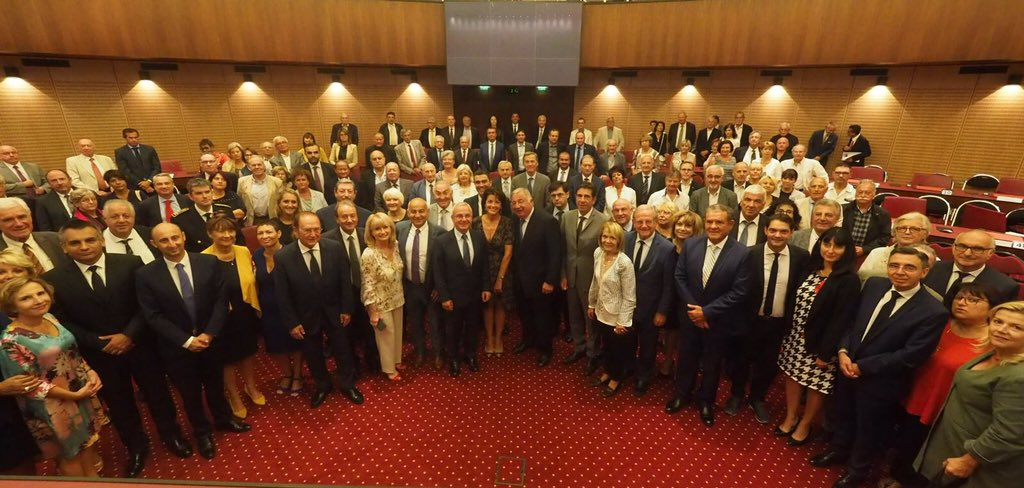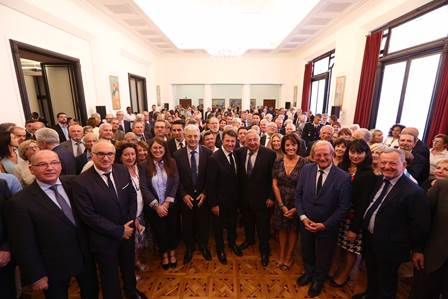During his visit this Thursday in the Alpes-Maritimes, the President of the Senate, Gérard Larcher, on a tour in France to spread his position in favor of the territories, the cornerstone of the proper functioning of the State, which can no longer be confined to a centralizing and “Parisian” vision.
Moreover, Gérard Larcher considers himself the foremost representative of the Republic’s territories and the guarantor of territorial equity. A role enshrined at the heart of the Constitution that states the Senate “ensures the representation of territorial communities”.
As the president of an assembly with a majority of a different political color than the national assembly, Gérard Larcher knows he is indispensable and, by his position, the true leader of the legislative opposition. As a result, he uses his power to block and slow down the government’s activities.
“Only the Senate bears the voice of the territories” is an effective tactical choice, which grants him significant weight in public debate and makes him the advocate of “republican cohesion”.
“The Prime Minister has announced that he plans to propose a comprehensive reform of local taxation in the first half of 2019. This reform cannot come out of thin air, without prior groundwork. I will solemnly request that this be the case,” concluded Gérard Larcher.
As a reminder, the national territorial conference last July took place without the representatives of the associations of mayors, departments, and regions.
It’s true that these organizations are predominantly right-wing…

The President of the Senate began his long day by responding yesterday morning to the invitation issued by Charles Ange Ginésy, president of the Alpes-Maritimes Department, at the Departmental Hotel, who did not hesitate to express his agreement: “The vast majority of public policies are built on the ground. It is by trusting the local level, the territories of France, that we improve the economic, social, and political situation of our country.”
While everyone agrees on the general principle, it is in the implementation that differences appear, and the landing point is not unanimous: “At a time when some want to eliminate the Departments in favor of large globalized metropolises, I believe instead that the departmental level is the basic unit of our institutional system. I am deeply departmentalist,” affirmed Charles-Ange Ginésy in reminding that 80% of the communes group 20% of the department’s population.
In the afternoon, the scenario changed at the Nice town hall, transformed into an annex of the Metropolis.

While Christian Estrosi’s first words were soothing: “If the State wishes to successfully carry out the reforms our country needs, it will not be able to do so without the territories because we are the first political force in the country, [providing 70% of public procurement], the continuation had the tone of a clear message:
“Beyond the State/Collectivity dialogue, I also believe in the dialogue between collectivities.
There is an easy rhetoric that constantly denounces the territorial divide and sets communities against each other. We must put an end to this false opposition between large metropolises and rural territories. We should instead promote synergies between the territories, between urban and rural.”
And the elected representative doesn’t hesitate to cite an example: “When a metropolis develops its fiber optic throughout its territory, it is favorable to the rural world.”
The attack is direct: “Mr. President of the Senate, you regularly denounce territorial divides. You are here in a Metropolis, both urban and rural, that ensures daily solidarity between the territories. And that despite everything we’ve been stripped of.”
The theme is strategic: “The Government has opened a debate on the institutional organization of our country and the role of European-dimension Metropolises for several weeks. Prime Minister Edouard Philippe has tasked the Regional Prefect with consultation on the possible expansion of the Marseille-Aix-en-Provence metropolis through its merger with the Bouches-du-Rhône department.”
The conclusion is an explosive statement: “I ask for your support so that the territory of the Nice Cote d’Azur Metropolis, as well as that of the Alpes-Maritimes, are not relegated and obtain the same status.”
The impact is strong: the proposal is nothing less than to absorb the Department into a future Côte Azur Metropolis!!!
It’s not certain that Gérard Larcher didn’t think he might have been better off staying in Paris at that moment.
But, we know his ability to bend, to get along with everyone, and to advocate trust, consideration, and respect between all parties.
As for what will be the institutional reform, his recipe is simple: “the best is a differentiated solution, left to the agreement of all concerned parties.”
And he explains it this way: “The principle that asserts a united and indivisible France does not mean the uniformity of its management organization.”


